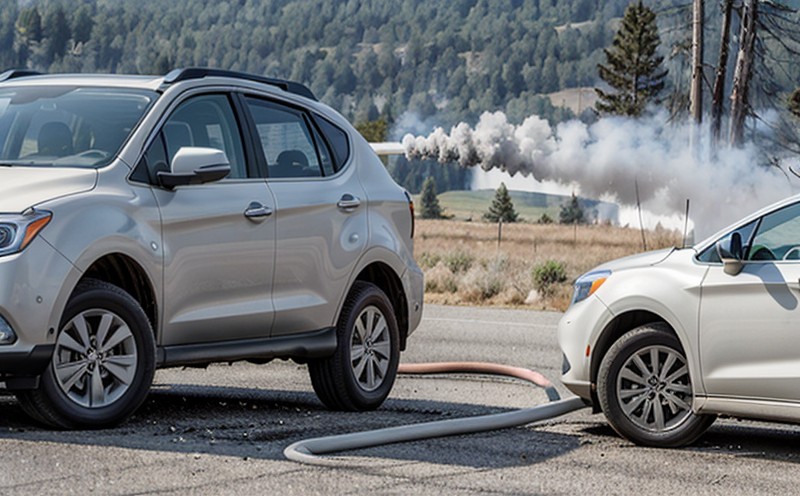Smoke Opacity Measurement in Fire Scenarios
The measurement of smoke opacity during fire scenarios is a critical aspect of fire safety testing. This service ensures that materials and products used in construction, manufacturing, and other industries meet stringent standards for fire resistance and structural integrity. Smoke opacity is the degree to which smoke obscures light from passing through it, and accurate measurement can determine how effective a product or material is at preventing the spread of flames and toxic gases.
The importance of this test cannot be overstated in sectors like building construction, automotive manufacturing, and material science. For instance, in high-rise buildings, even small increases in smoke opacity can significantly affect escape routes during emergencies. In vehicles, proper smoke opacity measurement ensures that passengers have a clear path to exits, reducing the risk of injury or death.
Testing for smoke opacity involves exposing materials or products to controlled fire scenarios and measuring the resulting smoke using specialized equipment such as nephelometers or integrating spheres. This process allows us to determine the opacity levels at various points in time, which is essential for understanding the material's performance under real-world conditions.
The acceptance criteria for these tests are based on international standards like ISO 13925-1 and ASTM E662. These standards provide clear guidelines on how to conduct the test, what equipment should be used, and what levels of opacity are acceptable or unacceptable. Compliance with these standards ensures that products meet fire safety requirements and can be trusted in critical applications.
Real-world usage notes highlight the importance of this service across various industries. In construction, for example, the use of materials with low smoke opacity can significantly improve building safety during fires. Similarly, in automotive manufacturing, ensuring proper smoke opacity is crucial for vehicle safety and compliance with regulations.
The testing process typically involves several steps: specimen preparation, setup of the fire chamber, application of the fire source, measurement using specialized equipment, and analysis of results. Each step requires precision to ensure accurate and reliable data. Specimen preparation includes ensuring that the material or product is representative of what will be used in real-world applications. The fire chamber setup ensures consistent conditions for testing, while the fire source provides a controlled environment for observing smoke opacity.
Specialized equipment such as nephelometers and integrating spheres play a crucial role in this process. Nephelometers measure light scattered by particles in the smoke, providing data on opacity levels. Integrating spheres capture the entire light field of the emitted radiation, offering comprehensive analysis. These tools are essential for obtaining accurate measurements that can be used to make informed decisions about product design and safety.
The results of these tests provide valuable insights into the performance of materials and products under fire conditions. By measuring smoke opacity, we can determine how effectively a material or product blocks light, which is critical for ensuring safe evacuation routes during fires. Compliance with international standards not only ensures regulatory compliance but also enhances public confidence in safety measures.
In conclusion, the measurement of smoke opacity during fire scenarios is a vital service that contributes significantly to fire safety and structural integrity. It allows us to assess materials and products accurately, ensuring they meet stringent standards and perform reliably under extreme conditions. This service plays a crucial role in protecting lives and property across various industries.
Why It Matters
The measurement of smoke opacity during fire scenarios is essential for several reasons. First and foremost, it helps ensure the safety of occupants in buildings and vehicles by providing clear pathways for evacuation. High levels of smoke opacity can obstruct these routes, making it difficult or impossible for people to escape safely.
- Building Construction: In high-rise buildings, even small increases in smoke opacity can significantly affect escape routes during emergencies.
- Automotive Manufacturing: Proper smoke opacity is crucial for vehicle safety and compliance with regulations.
- Material Science: Ensuring proper smoke opacity is essential for the design and development of fire-resistant materials used in various industries.
Beyond safety, this service also contributes to environmental protection by minimizing the release of harmful gases into the atmosphere. By reducing the amount of toxic gases emitted during fires, we can help protect public health and reduce pollution levels.
In addition to these benefits, accurate smoke opacity measurement helps manufacturers comply with international standards such as ISO 13925-1 and ASTM E662. Compliance with these standards ensures that products meet fire safety requirements and can be trusted in critical applications.
Quality and Reliability Assurance
To ensure the highest quality and reliability, we adhere to strict procedures and use advanced equipment for smoke opacity measurement during fire scenarios. Our testing facilities are equipped with state-of-the-art nephelometers and integrating spheres, which provide accurate and consistent data.
- Nephelometers: These devices measure light scattered by particles in the smoke, offering precise measurements of opacity levels.
- Integrating Spheres: These instruments capture the entire light field of emitted radiation, providing comprehensive analysis.
We also employ experienced and certified technicians who are trained to follow international standards such as ISO 13925-1 and ASTM E662. This ensures that our tests are conducted consistently and accurately, producing reliable results.
Our commitment to quality extends beyond just the testing process. We work closely with clients to understand their specific requirements and provide customized solutions tailored to their needs. Whether you need assistance with specimen preparation, fire chamber setup, or analysis of results, we have the expertise to meet your expectations.
In addition to our technical capabilities, we also prioritize customer satisfaction by providing timely and transparent communication throughout the testing process. Our goal is to ensure that clients receive accurate, reliable data that can be used confidently in their decision-making processes.





